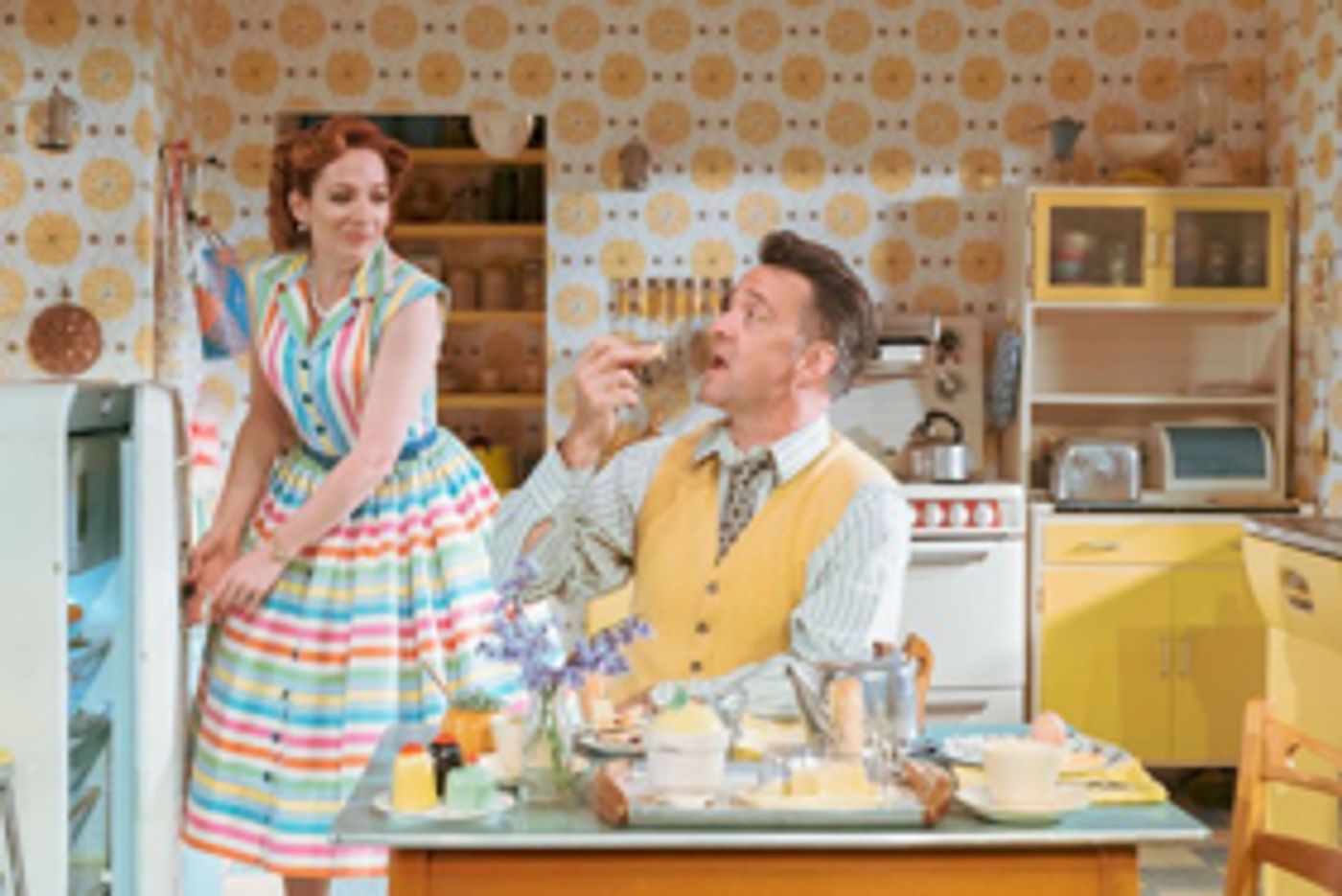Review: HOME, I'M DARLING, National Theatre

![]() The first thing we see is Anna Fleischle's Fifties-tastic giant doll's-house set: each period-perfect room bathed in a different twinkling hue, flowers painted onto the brick wall, and jaunty music setting the tone. But Katherine Parkinson's Judy is able to open the front wall like a folding door - clearly establishing that this life, and this contentment, is just a façade.
The first thing we see is Anna Fleischle's Fifties-tastic giant doll's-house set: each period-perfect room bathed in a different twinkling hue, flowers painted onto the brick wall, and jaunty music setting the tone. But Katherine Parkinson's Judy is able to open the front wall like a folding door - clearly establishing that this life, and this contentment, is just a façade.
After taking voluntary redundancy from her unsatisfying finance job, Judy and husband Johnny decided to take their passion for all things Fifties - indulged in dancing and vintage festivals - to the next level: actually live in the era fulltime. Significantly, the couple don't have children, making this a personal choice rather than a matter of practicality or necessity.
Judy is the domestic goddess, following a vintage handbook to the letter and decanting modern groceries into old-fashioned receptacles. She dresses in pristine, voluminous frocks and touches up her make-up in preparation for greeting her husband when he gets in from work - slippers, cocktail and newspaper at the ready.
At first, their marriage seems as cartoon-bright as the colour scheme. "Are you happy?" they ask one another over a lovingly prepared breakfast. "Terribly. Appallingly." But the language is telling, and Laura Wade's superbly paced play (a Theatr Clwyd co-production) gradually peels back the layers to show us the darkness beneath.
This witty conceit proves inspired: a vivid and unusual way of tackling topics like the roles we play in relationships, the current intricacy of gender politics, how screen addiction and modern conveniences affect the domestic sphere, and the anxiety many feel when confronted with an increasingly bleak and isolating world.
On one level, Judy's choice is almost certainly rebellion against her mother, who brought her up on a left-wing commune - which she remembers as feminist and CND preaching, dirt and brown food, all controlled by a cult-like figure.
But there also seems to be a genuine fear of confronting anything dark or upsetting. Judy flinches at swearing and crude references, and refuses to hear her friend Fran's concern that Johnny might be cheating on her - either with someone else, or by eating modern food in the new shopping centre they swore to boycott.
Given the current state of affairs, wanting to slip into another time is certainly tempting - just look at the popularity of The Great British Bake Off - and this is escapism writ large (aided by other escapist means, like vast quantities of Fifties booze). But it is, of course, the false, misinformed nostalgia of Brexit and Trump that has led us to the brisk of disaster; likewise, there's hypocrisy in Judy rejecting consumerist culture while scouring eBay for Fifties finds.
Wade slyly teases out the ways in which avoidance of reality can become toxic, and a passion that once united this couple can start to divide them. Judy's mother is savagely honest about what the Fifties were really like - particularly for anyone who wasn't a wealthy, straight white man - and also in pointing out that this devotion to domesticity won't be valued until men do it too.
There's a fascinating tension between these two women, representing different generational struggles. Judy has a point in noting that freedom of choice means she can follow this path if she wants - though there's a sense in which modern women are doomed no matter what they prioritise. However, Judy's decision is clearly more psychologically complex than she wants to acknowledge.
Wade also shows compassion towards her male characters - Johnny, who knows he should be revelling in this, but actually feels both infantilised and stressed about being the sole provider; and their friend Marcus, accused of sexual harassment at work. The latter is rivetingly explored in an intimate scene, shifting between a fetishised version of this Fifties play and showing the queasy, all-important power dynamics in this situation.
Tamara Harvey's dynamic production so fully immerses us in this period world that it's genuinely shocking to see a laptop or hear a mobile ring. When Johnny's new boss Alex - a distinctly modern woman in sharp trousers - arrives for an excruciating cocktail party, she looks like a time traveller.
Conversely, we see how Judy is defined, and also trapped, purely through wardrobe: the pinched walk in high heels, the stiff formality of her constricted waist, and the limitations - even absurdity, in Alex's presence - of her tent-like skirts.
Parkinson is extraordinary in this role, from the manic, overly bright housewife act to teeth-gritting confrontations with her mother, lightning-fast reaction shots, and finally a poignant breakdown. Sian Thomas is also electrifying as her exasperated mother, who finally punctures Judy's perfect vision of her father. Of course no one or era is perfect; it's just that appearances are sometimes valued more than honesty.
There's excellent work too from Richard Harrington as the perturbed Johnny, Sara Gregory's perceptive Alex, Barnaby Kay's borderline problematic Marcus, and, in particular, the very funny Kathryn Drysdale as outspoken Fran.
A cracking piece that uses the dream of the past to provide real insight into the present.
Home, I'm Darling at the National Theatre until 5 September
Photo credit: Manuel Harlan
Reader Reviews
Videos

